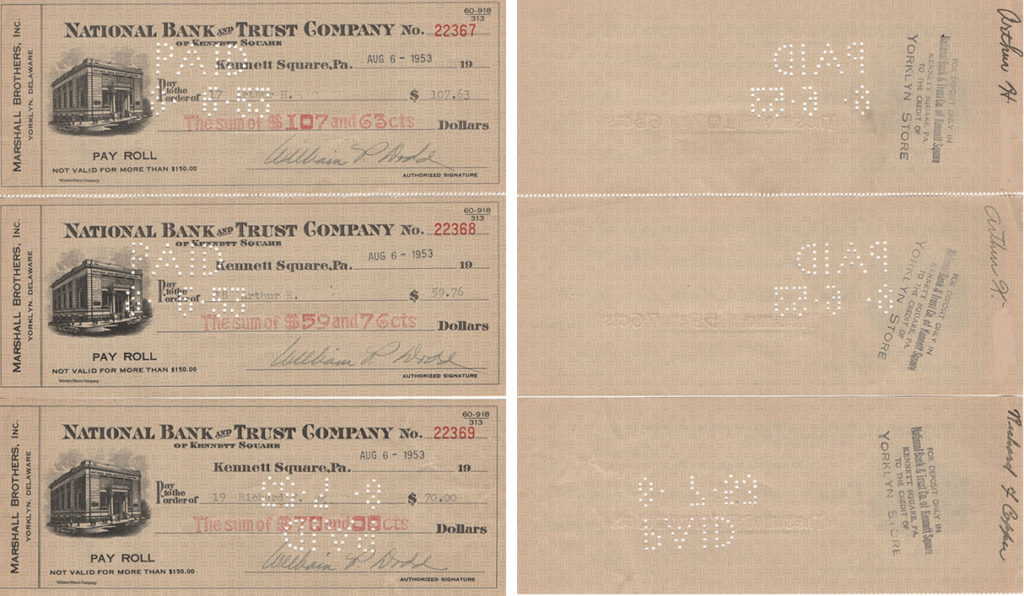CHECKING-IT
For the past several years the unrestored Marshall Brothers Paper Mill has been open one or two weekends during nice weather for tours between May and November. Offering a 1 PM and 3 PM guided tour on tour days, a typical tour hosts 6 to 10 individuals. For Teresa, Elliott, and the writer whom serve as tour guides, the tours have been especially enjoyable to host as former NVF and Marshall Brothers employees return to the mill. As tour hosts, we learn first-hand from our guests what it was like to work the various jobs NVF offered. We glean from these former participants assorted historical facts and information about the mill, the Yorklyn area, and NVF and its management. We’ve hosted descendants of the Garret family and on one occasion had historic materials returned.
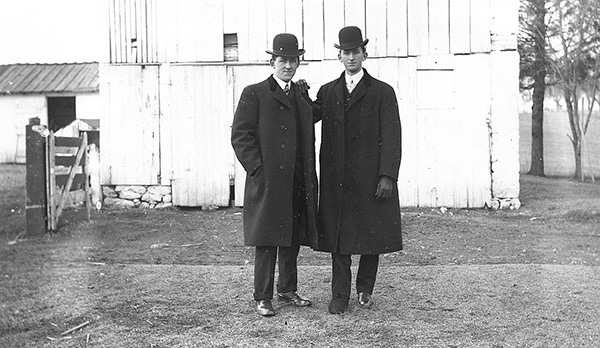 During a late summer tour this past year, a box of now historical Marshall Brothers financial records covering two decades was returned to the State. The records were inside a locked safe the individual had acquired from NVF in the 1970s as part of renovations to the former mill office building (now the Park office). It took nearly three years of sleuthing for the individual to safe-crack the safe through trial and error. The treasures found inside were all ironically paper in composition! No secret formulas or other riches however we now have records showing that the blue, red, and yellow paper used to make World War II ration tokens of vulcanized fiber were made at Marshall Brothers in 1944 and 1945! Copies of tax returns, operating budgets, and corporate checks from the final year of Marshall Brothers operations (1953) along with financial reports that were lost to time inside the safe were rediscovered in 1970 but preserved by a former employee a further half century for historians. Pictured are T. Clarence Marshall, President of Marshall Brothers Company, Inc. and his older brother J. Warren Marshall, President of National Vulcanized Fiber Company, Inc.
During a late summer tour this past year, a box of now historical Marshall Brothers financial records covering two decades was returned to the State. The records were inside a locked safe the individual had acquired from NVF in the 1970s as part of renovations to the former mill office building (now the Park office). It took nearly three years of sleuthing for the individual to safe-crack the safe through trial and error. The treasures found inside were all ironically paper in composition! No secret formulas or other riches however we now have records showing that the blue, red, and yellow paper used to make World War II ration tokens of vulcanized fiber were made at Marshall Brothers in 1944 and 1945! Copies of tax returns, operating budgets, and corporate checks from the final year of Marshall Brothers operations (1953) along with financial reports that were lost to time inside the safe were rediscovered in 1970 but preserved by a former employee a further half century for historians. Pictured are T. Clarence Marshall, President of Marshall Brothers Company, Inc. and his older brother J. Warren Marshall, President of National Vulcanized Fiber Company, Inc.
While it is easy to realize what one can learn from tax returns, the story of token paper will remain for a future Question & Answer. What sorts of information were able to be obtained from cancelled checks?
Answer
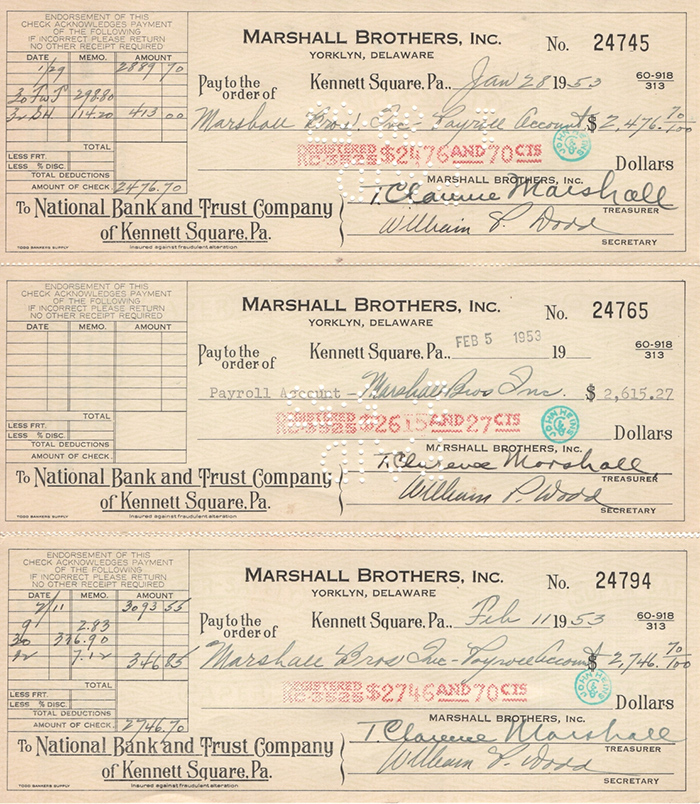 Two different sets of cancelled checks were included in the cache of materials returned. The smallest quantity of cancelled checks belonged to the Marshall Brothers, Inc. general account that was held at National Bank and Trust Company of Kennett Square, Pa. The checks were from 1953, the final year the Marshall family was involved in the vulcanized fibre business. After J. Warren Marshall died in June 1953, Eugene R. Perry succeeded Marshall as President. Within a year Marshall Brothers, run by Clarence Marshall, was bought by National Vulcanized Fiber ending 97 years of Marshall family involvement in the paper, fibre, and fibre products business.
Two different sets of cancelled checks were included in the cache of materials returned. The smallest quantity of cancelled checks belonged to the Marshall Brothers, Inc. general account that was held at National Bank and Trust Company of Kennett Square, Pa. The checks were from 1953, the final year the Marshall family was involved in the vulcanized fibre business. After J. Warren Marshall died in June 1953, Eugene R. Perry succeeded Marshall as President. Within a year Marshall Brothers, run by Clarence Marshall, was bought by National Vulcanized Fiber ending 97 years of Marshall family involvement in the paper, fibre, and fibre products business.
Each week of 1953 a check drawn on the Marshall Brothers general account was issued to the Marshall Brothers payroll account. These checks ranged from a few hundred to a few thousand dollars a week. Shown is a group of three checks in the $2,600 per week range for January 28th and February 5th & 11th. The checks were written mid-week and signed by Clarence as President and William P. Dodd as corporate secretary.
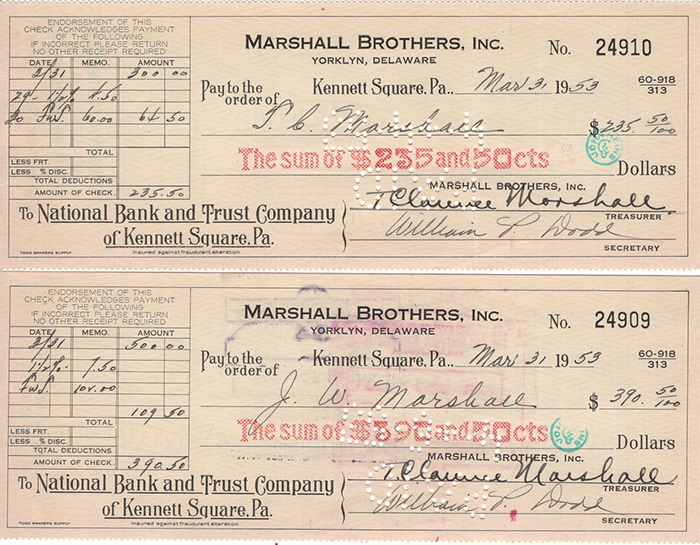 From the same series of general account checks we learn that J. Warren (Israel Marshall’s oldest son and president of National Vulcanized Fiber) received $390.50 a month salary ($4,358.57 in 2022 dollars) while T. Clarence (Israel Marshall’s second oldest son and president of Marshall Brothers) received $235.50 per month salary ($2,628.53 in 2022 dollars). While the company was privately held, both received quarterly 10% dividend on the shares of Marshall Brothers stock shares each held which amounted to $3,500 ($39,065.24 in 2022 dollars) for T. Clarence and $5,050 ($56,365.57 in 2022 dollars) for J. Warren. In 1938, J. Warren was listed in a U.S. Congressional House of Representatives report of corporate executive officers earning over $50,000 a year as one of the top ten highest paid corporate executives in the United States.
From the same series of general account checks we learn that J. Warren (Israel Marshall’s oldest son and president of National Vulcanized Fiber) received $390.50 a month salary ($4,358.57 in 2022 dollars) while T. Clarence (Israel Marshall’s second oldest son and president of Marshall Brothers) received $235.50 per month salary ($2,628.53 in 2022 dollars). While the company was privately held, both received quarterly 10% dividend on the shares of Marshall Brothers stock shares each held which amounted to $3,500 ($39,065.24 in 2022 dollars) for T. Clarence and $5,050 ($56,365.57 in 2022 dollars) for J. Warren. In 1938, J. Warren was listed in a U.S. Congressional House of Representatives report of corporate executive officers earning over $50,000 a year as one of the top ten highest paid corporate executives in the United States.
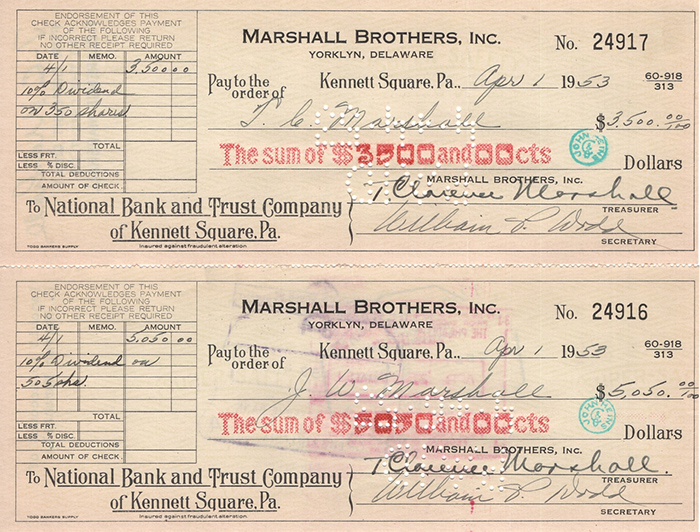 By far the biggest quantity of checks in the cache of records were those of the Marshall Brothers payroll account also held at National Bank and Trust Company of Kennett Square, Pa. These checks had an upper limit of $150.00, however, most were valued around half that amount ($75 in 1953 is $837.11 in 2022). These checks generally had the payee’s name typed. The highest employee number was 43 although there were temporary employees who had a check hand-written by Mr. Dodd with no employee number. Of interest was nearly half the checks were endorsed on the back by the employee and stamped “For deposit only in National Bank & Trust Company of Kennett Square to the credit of Yorklyn Store”. The Gregg family operated the general store on Yorklyn Road and many local employees would simply endorse their payroll check over to Grover C. Gregg as part of paying off a previous week’s tab, picking up food and other items for the coming week, and perhaps getting some ‘pocket money’ for the coming week!
By far the biggest quantity of checks in the cache of records were those of the Marshall Brothers payroll account also held at National Bank and Trust Company of Kennett Square, Pa. These checks had an upper limit of $150.00, however, most were valued around half that amount ($75 in 1953 is $837.11 in 2022). These checks generally had the payee’s name typed. The highest employee number was 43 although there were temporary employees who had a check hand-written by Mr. Dodd with no employee number. Of interest was nearly half the checks were endorsed on the back by the employee and stamped “For deposit only in National Bank & Trust Company of Kennett Square to the credit of Yorklyn Store”. The Gregg family operated the general store on Yorklyn Road and many local employees would simply endorse their payroll check over to Grover C. Gregg as part of paying off a previous week’s tab, picking up food and other items for the coming week, and perhaps getting some ‘pocket money’ for the coming week!